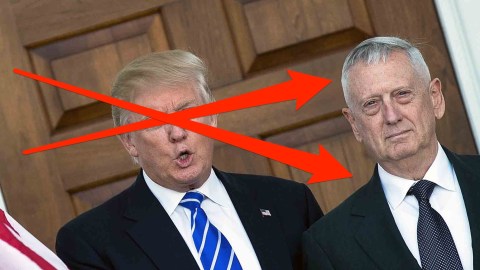General “Mad Dog” Mattis’s 3-point Plan to Make America Great Again

This piece is part of a larger series examining what big ideas a Trump administration could use to achieve its most ambitious goals. Read more entries in our “The Art of the Bill” series here.
Retired Marine Gen. James N. Mattis is known as “Chaos,” “Warrior Monk,” and “Mad Dog.” The names reflect his blunt way of speaking — and his ability to cut through bullsh*t to get results. He is President Trump’s confirmed Secretary of Defense, and he’s got a few thoughts on how to make America great again.
1: America Is Not an Island — or a Federation
America now is built on the ideology of the post-WWII generation, meaning the institutions of this country, and its attitudes toward the rest of world, revolve around one idea: the world works best when countries work together to stop global threats. “The constructed order reflected the wisdom of those who recognized no nation lived as an island and we needed new ways to deal with challenges that for better or worse impacted all nations,” Mattis writes for Hoover Institution. “Like it or not, today we are part of this larger world and must carry out our part… The international order built on the state system is not self-sustaining.”
Given that both President Trump and the Republican Congress are strong supporters of state’s individual rights over federal government oversight, this idea may be the hardest idea to sell to the upcoming administration. But it’s imperative that we try, as political philosopher Michael Sandel explained:
2: Prioritize Threats Accurately
Who exactly is America fighting? Why? What exactly is America fighting, ideology-wise? These questions are unclear — and they need to be answered in order to best allocate resources, manpower, and funding under the Trump administration. “Murky or quixotic political end states can condemn us to entering wars we don’t know how to end,” Mattis writes. He calls on the intelligence committee to “delineate and provide an initial prioritization” of all current threats to the US in order to solve these questions, including “rigorously defining the problems” and creating a “more intelligent and focused use of [national defense] resources.”
The biggest physical threat Mattis identifies is the Middle East as a whole, where he notes “our influence is at its lowest point in four decades.” Because our influence is waning, Mattis urges the American military to take a relaxed leadership position where we “recognize that regional counterweights like Egypt, Saudi Arabia, the United Arab Emirates, and the rest of the Gulf Cooperation Council can reinforce us if they understand our policies and if we clarify our foreign policy goals beyond Iran’s nuclear weapons program.”
The biggest ideological threat Mattis identifies is defining Islam vs jihadists.“Violent terrorists cannot be permitted to take refuge behind false religious garb and leave us unwilling to define this threat with the clarity it deserves.” he states. That is a tall order for an issue that is political to its core in the post-9/11 era. Yet, he offers a few questions that will help the administration clarify its dealings: “Is political Islam in our best interest? If not what is our policy to support the countervailing forces?”
Those are worthwhile questions to ask, as Salman Rushdie told us in this interview:
3: Stop Cutting Military Budgets and Refocus Resources
The biggest challenge to the US military isn’t ISIL, according to Mattis: it’s sequestration. Sequestration, or “spending limits on the federal government” per The Hill, “mandates $1.2 trillion in cuts across federal agencies to include $500 million to the military over the next decade,” as part of the 2011 Budget Control Act, according to Military.com. The Department of Defense detailed the damage of those cuts in a report, citing cuts to transit, modernization, and weapons programs — as well as personnel:
The Army would be reduced to 420,000 active duty soldiers along with 315,000 in the Guard and 185,000 in the Reserve. The Marine Corps would drop to 175,000 active duty personnel. The Air Force would have to eliminate its entire fleet of KC-10 tankers and shrink its inventory of unmanned aerial vehicles (UAVs). The Navy would be forced to mothball 6 destroyers and retire an aircraft carrier and its associated air wing, reducing the carrier fleet to ten.
General Mattis is not a fan — but his answer isn’t to bulk the military back up. “With less military available, we must reduce our appetite for using it,” he explains. “Tiered readiness with a smaller force must be closely scrutinized to ensure we aren’t merely hollowing out the force,” Mattis urges. He continues with specific applications for the Army, Air Force, and Navy:
With the cutbacks to the Army and Air Force and fewer forces around the world, military aspects of our strategy will inevitably become more naval in character… Are the Navy and our expeditionary forces receiving the support they need in a world where America’s naval role is more pronounced because we have fewer forces posted overseas?
Most shocking of all, Mattis advises the Trump administration to do that without increasing the national debt. “If we refuse to reduce our debt or pay down our deficit, what is the impact on national security for future generations who will inherit this irresponsible debt and the taxes to service it?” Mattis writes. “No nation in history has maintained its military power while failing to keep its fiscal house in order.” That is a tall order for President Trump who is comfortable with debt — which might be why Mattis proposes another government entity to take charge of it: “The Senate Armed Services Committee should lead the effort to repeal the sequestration that is costing military readiness and long term capability while sapping troop morale.”
All of those suggestions are sensible — as Dov Zakheim told us about his experience in the Department of Defense:
While these points are well-crafted and Mattis rallies leaders to “take a firm strategic stance in defense of our values” by implementing them, he doesn’t actually state what those values are. Those values will be key to determining any future strategy, military or otherwise. Those values are also key to uniting a nation splintered by a brutal, chaotic election. Until we can all sit down and define those shared values, we’re only going to get ourselves into trouble.
—





